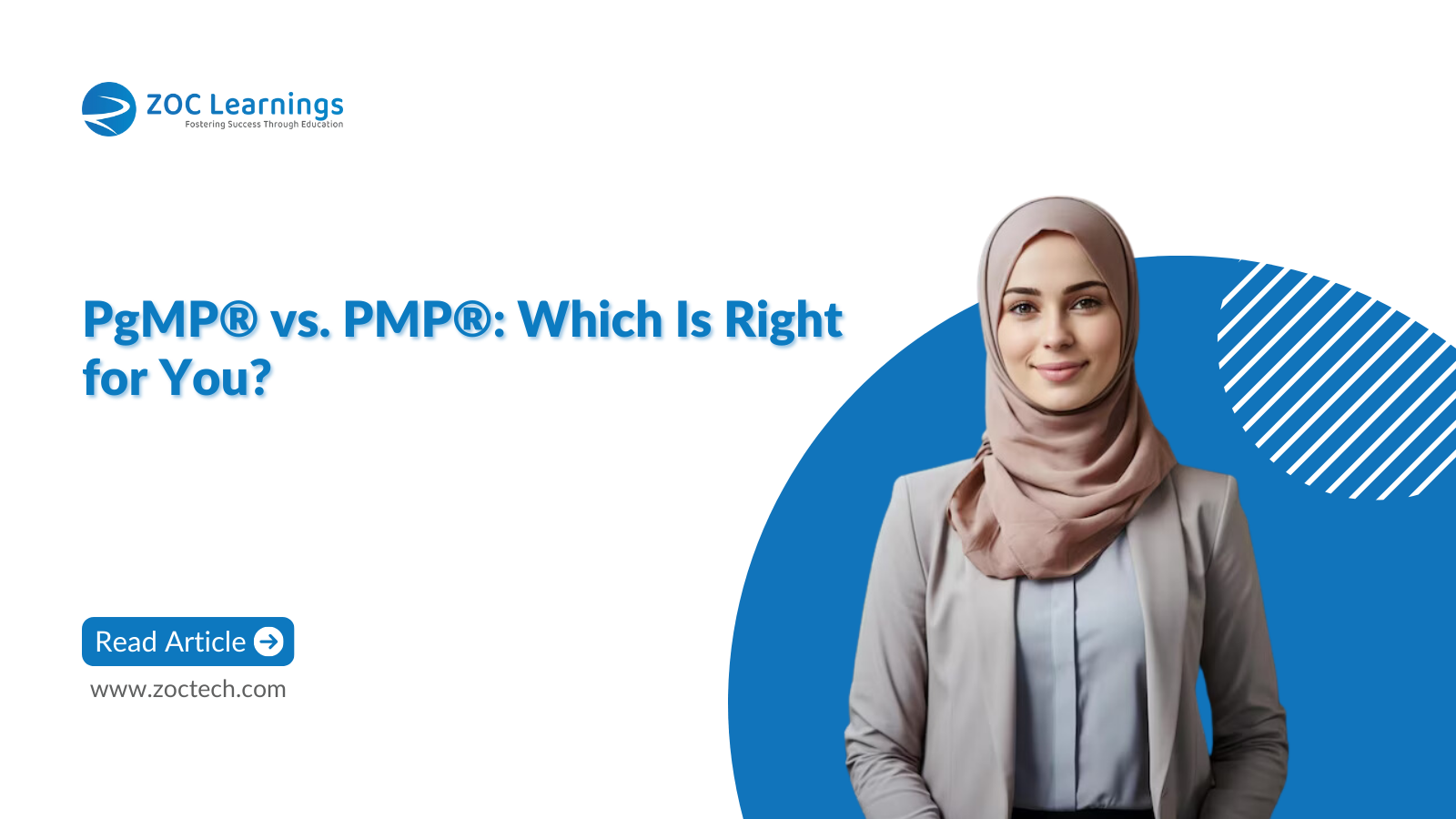Two acronyms have been making waves: Program/Portfolio Management – PgMP®(Program Management Professional) Project Management –PMP® (Project Management Professional). While making a decision and planning your career, it is better to know the similarities and differences between PgMP® vs PMP®. Thus, this article is aimed to guide you through the decision-making process.
Understanding the Basics of PgMP®:
The PgMP® certification is launched by the Project Management Institute (PMI) for those who want to become experienced managers of multiple projects and projects’ portfolios. It prepares people with skill and knowledge which they need in the workplace to manage intricate programs towards organizational goals and strategies.
Key Highlights of PgMP®:
– Focus on project program management
– Ideal for people holding advanced positions in their companies
– Focuses on the alignment of the oriented strategy
– They require education and experience in order to be effective on the job.
Understanding the Basics of PMP®:
PMI also directs another certification known as the PMP®(project management professional) to individuals with an intention of practicing project management. This is suitable for people who wish to manage small projects from inception to completion and guarantee that they deliver value within the provided set standards.
Key Highlights of PMP®:
– Emphasis on project oriented program
– Suitable for project managers
– Waters down principles associated with the project life cycle
– This course requires documented project management experience
Eligibility Criteria:
It is especially important to first note some of the basic requirements. It makes a candidate eligible to sit for these certification exams:
- PgMP® Eligibility:
To be eligible for the PgMP® exam, you must meet the following requirements:
1. Minimum qualification of four years of experience on project management.
2. At least four years of experience working on program management.
3. A secondary level of education (essentially, senior high school graduate or equivalent, associate degree but not limited to).
- PMP® Eligibility:
For the PMP® certification, candidates should meet the following prerequisites:
1. Project management experience must be at least 3 years.
2. 35 contact hours of project management education/training to acquire the Certified Associate in Project Management® (CAPM)®.
3. Requires a secondary education or four years education (bachelor’s degree or comparable).
Exam Content
- PgMP® Exam:
The PgMP® exam tests your capability and readiness to manage and supervise intricate pgmp certification effectively. It covers three domains:
1. Program Strategy Alignment: Evaluating your capacity to streamline program delivery to respond to the needs of an organization.
2. Program Benefits Management: Emphasizing the timely provision of the Program’s advantages.
3. Program Governance: To properly assess and manage stakeholders within programs.
- PMP® Exam:
On the other hand, the PMP® exam focuses on checking your ability in successfully managing individual projects. It covers five domains:
1. Initiating: Determining and describing the boundary of a project.
2. Planning: Generating a master schedule of the proposed project.
3. Executing: Sustaining and executing the identified project plan.
4. Monitoring and Controlling: Supervising the work progress of a project and modifiying it as appropriate.
5. Closing: Project wrap up and closing all activities and all project related activities.
Career Prospects
PgMP® Career Opportunities:
Earning a PgMP certification opens doors to various career opportunities, including:
1. Program Manager: Managing complex programmes in organizations.
2. Portfolio Manager: Managing a set of projects and programmes.
3. Director of Program Management: To implement instructional program leadership, you need to hold the key leadership post in the instructional program.
PMP® Career Opportunities:
A PMP® certification enhances your prospects in roles such as:
1. Project Manager: Leading individual projects.
2. Program Manager: Co-ordinating a number of projects in a program.
3. Project Management Consultant: Advising organizations on the most efficient ways of managing projects.
Which Certification Is Right for You?
This brings the comparison between PgMP® vs PMP to an end – the decision of the two certifications depends on one’s career and experience. Here’s a simplified breakdown to pguide your decision:
– Choose PgMP® if:
– You have good experience in program management.
– Your career plans imply the management and directional correlation of large scale programs.
– Choose PMP® if:
– Your focus is mostly on the project management stage.
– You want to be responsible for organizing and executing minor projects from planning to completion.
Conclusion
When it comes to project and program management, two certifications appear to be highly valuable and recognized – PgMP® vs PMP. They both are fit for different professional plans and need different skills and experiences to be used for a particular job. However, before making the decision, it is relevant to analyse your experience, your career objectives, and the positions that are likely to be applied for.
Lastly, it is important to recall that your certification decision is the important milestone on your way to career growth in the evolving field of project management.
FAQs
1. What are the similarities and differences between PgMP® and PMP® certifications?
– Answer: While PgMP speaks about Program Management and PMP is all about Project Management, the difference is quite explicit and noticeable. PgMP® is the course that is based on the program management aspect, and on the other hand the PMP® is based on the project management aspect. The difference lies in handling a number of interlinked projects as a programme and handling individual projects as a project.
2. Should I get PMP® and PgMP® certification for my career?
– Answer: If your goal is to be in the Project Management profession at a level where you will oversee complex programs that encompass many projects, then PgMP® is the way to go. PMP® is perfect if you plan to be successful in handling single projects. Remember the fact that you have to choose this decision in terms of career planning and your likes or dislikes.
3. What are the key differences between the form of exams for PgMP® and PMP® certification?
– Answer: This is the only difference between the exam formats of the two: PgMP® and PMP®. PMP® is an examination of 200 multiple choice questions. The PMP® exam measures the knowledge in the five process groups of project management. PgMP®’s assessment includes multiple choice tests and panel review.
4. Which one of the two is more recognized internationally, PgMP® or PMP®?
– Answer: PMP® is well known worldwide whereas PMB demonstrates lesser global recognition since it focuses greatly on project management. However, PgMP® is starting to be cultivated for program management positions. It depends on your intended line of duty or job and the place you intend to practice more often.











